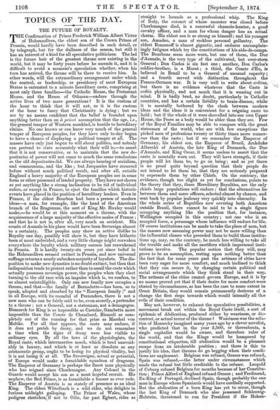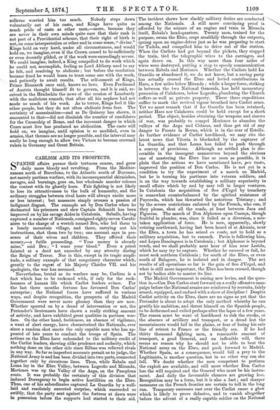TOPICS OF THE DAY.
THE FITTITRE OF ROYALTY.
THEConfirmation of Prince Frederick William Albert Victor of Hohenzollern, the eldest son of the Crown Prince of Prussia, would hardly have been described in such detail, or by telegraph, but for the dullness of the season, but still it has an interest of a kind for all speculative politicians. The lad is the future heir of the greatest throne now existing in the world, but it may be forty years before he ascends it, and it is difficult to avoid a moment's speculation whether, when his turn has arrived, the throne will be there to receive him. In other words, will the extraordinary arrangement under which the control, or leadership, or presidency of most European States is entrusted to a minute hereditary caste, comprising at most only three families—the Catholic House, the Protestant House, and the House of Othman—endure through the active lives of two more generations It is the custom of the hour to think that it will not, as it is the custom of the hour to fancy that Christianity is dying ; but we are by no means confident that the belief is founded upon anything better than an a priori assumption that the age, i.e., the general temper of Western mankind, is hostile to hereditary claims. No one knows or can know very much of the general temper of European peoples, for they have only to-day begun to have a chance of displaying a political temper at all. The masses have only just begun to will about politics, and nobody can pretend to state accurately what their will is,—to assert that it is not conservative, or to maintain that the new de- positaries of power will not come to much the same conclusions as the old depositaries did. We are always hearing of socialism, and communism, and the like ; but Jacqueries have occurred before without much political result, and after all, outside England a heavy majority of the European peoples are in some form or other possessed of landed property. They have not shown as yet anything like a strong inclination to be rid of individual rulers, or except in France, to eject the families which historic events have placed in the position of hereditary leaders. Even in France, if the eldest Bourbon had been a person of modern ideas—a man, for example, like the head of the American branch of the Braganzas, the sort of King Mr. Huxley would make,—he would be at this moment on a throne, with the acquiescence of a large majority of the effective males of France ; and that he is not is, after all, very much an accident. His cousin of Aumale in his place would have been Sovereign almost to a certainty. The peoples may show an active dislike to Royalty one day, possibly will show it, but they have hitherto been at most undecided, and a very little change might reawaken everywhere the loyalty which military success has reawakened in Prussia. It is hardly twenty-six years yet since belief in the Hohenzollern seemed extinct in Prussia, and now universal suffrage returns a nearly unbroken majority of loyalists. The dis- position to make new dynasties is no doubt extinct, but then that indisposition tends to protect rather than to assail the caste which actually possesses sovereign power, the peoples when they elect turning to the old race with an impulse which is, we confess, to us almost unintelligible. Only one new family now occupies a throne, and that—the family of Bernadotte—has been, so to speak, adopted and absorbed by the "European family ;" and
in all Europe, with its roomful of Pretenders, there is not a new man who can be fairly said to be, even secretly, a pretender to a throne ; not a General, not a statesman, not a demagogue.
Bismarck for King is as impossible as Castelar, Gambetta more impossible than the Comte de Chambord, Ricasoli as com- pletely out of the running for that prize as Marshal von Moltke. For all that appears, the caste may endure, if it does not perish by decay, and we do not remember a time when the signs of decay were less visible to ordinary eyes. By all the laws of the physiologists, the Royal caste, which intermarries much, which is bred unavoid- ably in luxury, and which is at least as dissolute as any aristocratic group, ought to be losing its physical vitality, but it is not losing it at all. The Sovereigns, actual or potential, of Europe would make a formidable squadron of dragoons. The Emperor of Germany is perhaps the finest man physically who has reigned since Charlemagne. Any Colonel in the Guards would accept his son as a most hopeful recruit. His nephew, the Red Prince, is as formidable a hussar as ever rode. The Emperor of Austria is as stately of presence as an ideal King. The eldest Wittelbach is a wild rider, who delights in furious midnight galloping. The Prince of Wales, whose pedigree stretches,lif not to Odin, far past Egbert, rides as
straight to hounds as a professional whip. The King of Italy, the coronet of whose ancestor was dosed before Charlemagne died, is a successful chamois-hunter, a good cavalry officer, and a man for whom danger has an actual charm. His eldest son is as strong as himself; and his younger son, Amadeo, a man of reckless personal gallantry. The. eldest Romanoff is almost gigantic, and endures uncomplain- mgly fatigues which try the constitutions of his aide-de-camps. The Bourbons seem more worn, but one of them, the Duc d'Aumale, is the very type of the cultivated, but over-stern General ; Don Carlos is six feet one ; another, Don Carlos's soldier-brother, is a Murat ; a third, the Comte d'Eu, is believed in Brazil to be a General of unusual capacity ; and a fourth served with distinction throughout the Franco-German war. It is very well to write about critins, but there is no evidence whatever that the Caste cretin physically, and not much that it is wearing out in
mind. It is badly bred, no doubt, particularly in Catholic countries, and has a certain liability to brain-disease, while it is mentally bothered by the clash between modern. ideas and the ideas it is convenient for a reigning caste to. hold ; but if the whole of it were shovelled into our own Upper House, the Peers as a body would be abler than they are. Few of the Royal Families may be able to compare with the great statesmen of the world, who are with few exceptions the. picked men of professions twenty or thirty times more numer- ous than the caste ; but if we remember the Emperor of Germany, his eldest son, the Emperor of Brazil, Archduke .Albrecht of Austria, the late King of Denmark, the Due d'Aumale, and King Oscar, it seems useless to assert that the caste is mentally worn out. They will have strength, if their people will let them be, to go on being ; and as yet there- is no proof quite beyond question that their people do not intend to let them be, that they are seriously prepared to supersede them by other Chiefs. On the contrary, the evidence, though too slight as yet for conclusions, points to the theory that they, these Hereditary Royalties, are the only- chiefs large populations will endure ; that the alternatives lie between them and mere officers, selected almost by chance, and sent back by popular jealousy very quickly into obscurity. In the whole series of Republics now covering both Americas. outside Brazil, there cannot be said to be a single figure. occupying anything like the position that, for instance, Wellington occupied in this country ; not one who is an. accepted force, a personage whose influence will endure for life. Of course institutions can be made to take the place of men, but the masses now assuming power may not be more willing than the influential classes who preceded them to build those institu- tions up, may, on the contrary, be much less willing to take all the trouble and make all the sacrifices which impersonal insti- tutions involve. The popular notion that they will, may prove to be an assumption, resting upon nothing better than the fact that for some years past the artisans of cities have been very eager for more comfort, and much inclined to think. that they can secure it, by changing certain political and. social arrangements which they think stand in their way. The artisans of the cities cannot govern Europe, and it is by no means proved yet that if their desire for more comfort were abated by circumstances, as has been the case to some extent in Great Britain, they would remain permanently desirous of a. change the first steps towards which would intensify all the evils of their condition.
May not, however, to exhaust the speculative possibilities, a. movement break out within the Royal Caste itself, a sort of epidemic of Abdication, produced either by weariness, or dis- content, or actual terror of the throne? Weariness was the solu- tion of Monarchy imagined many years ago by a clever novelist, who predicted that in the year 2,500, or thereabouts, a. single capitalist would be owner, and therefore ruler of the world, and that the Kings would be hampered by constitutional etiquettes, till abdication would be a pleasant escape from an intolerable position ; and there is this to justify his idea, that thrones do go begging when their condi- tions are unpleasant. Belgium was refused, Greece was refused,. Spain was refused,—the latter under circumstances which nine the refusal but little creditable to the refuser. Leopold of Coburg refused Belgium for months because of her Constitu- tion; Prince Alfred of England refused Greece ; and Ferdinand, Ex-King of Portugal, declined Spain, though probably the one man in Europe whom Spaniards would have cordially supported. But the abdication of a born King has yet to occur, though the last King of Denmark who also possessed Schleswig- Holstein, threatened to run for President if the Hohen- zollerns worried him too much. Nobody steps down voluntarily out of his caste, and Kings have quite as much pride of caste as other men,—more, because they are never in their own minds quite sure that their rank is not part of a Providential scheme, that their right of birth is not, on some interpretation or other and in some sense, " divine." Kings hold on very hard, under all circumstances, and would hold on, we imagine, even if the Crown ceased to be sufficiently or even decently gilded, or if the work were exceedingly severe. We could imagine, indeed, a King compelled to do work which he could not, accomplish, feeling as Lord Althorp used to say he felt, and resolving to abdicate ; but before the resolution became fixed he would learn to trust some one with the work, and patiently to await results. The self-conceit of Kings, Prince Bismarck once said, knows no laws. Even Ferdinand of Austria thought himself fit to govern, and it is said, re- ceived in the Hradschin the news of the cession of Lombardy with the malicious remark, that after all his nephew had not made so much of his work. As to terror, Kings feel it like other people, but they do not often abdicate from fear. The certainty of assassination—and as De Quincey has shown, it amounted to that—did not diminish the number of candidates for the CLesarship of Rome, and the incessant danger in which Czars must live has produced no abdication. The caste will hold on, we imagine, until opinion is so modified, even in armies, that thrones are no longer possible, and the interval may easily be long enough to allow two Victors to become crowned rulers in Germany and Great Britain.































 Previous page
Previous page